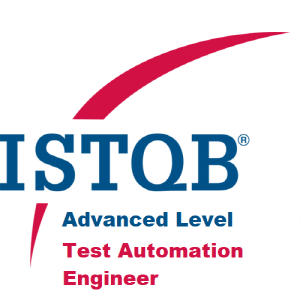
ISTQB ADVANCED – TEST AUTOMATION ENGINEER certificate is a for test automation engineer (TAE) in designing, developing, and maintaining test automation solutions. Advanced Level testers who have passed the “Advanced Test Automation Engineer” certification exam should be able to accomplish the following:
- Contribute to the development of a plan to integrate automated testing within the testing process
- Evaluate tools and technology for automation best fit to each project and organization.
- Create an approach and methodology for building a test automation architecture (TAA).
- Design and develop (new or modified) test automation solutions that meet the business needs.
- Enable the transition of testing from a manual to an automated approach.
- Create automated test reporting and metrics collection.
- Manage and optimize testing assets to facilitate maintainability and address evolving (test) system
Target Audience
This Advanced Level qualification is aimed at people who have achieved an advanced point in their careers in software testing. This includes people in roles such as testers, test analysts, test engineers, test consultants, test managers, user acceptance testers and software developers. This Advanced Level qualification is also appropriate for anyone who wants a deeper understanding of security testing.
Prerequisites
To receive Advanced Level certification in the module “Security Tester”, candidates must hold a valid Certified Tester Foundation Level certificate and have sufficient practical experience to be certified at Advanced Level, which should be not less than 3 (three) years of relevant academic, practical, or consulting experience. Refer to the relevant Exam Board to determine the specific practical experience criteria
Contents
- Explain the objectives, advantages, disadvantages, and limitations of test automation.
- Identify technical success factors of a test automation project.
- Analyse a system under test to determine the appropriate automation solution.
- Analyse test automation tools for a given project and report technical findings and recommendations.
- Understand “design for testability” and “design for test automation” methods applicable to the SUT.
- Explain the structure of the Generic Test Automation Architecture.
- Analyse factors of implementation, use, and maintenance requirements for a given Test Automation Solution.
- Explain the factors to be considered when identifying reusability of components.
- Apply guidelines that support effective test tool pilot and deployment activities.
- Analyse deployment risks and identify technical issues that could lead to failure of the test automation project, and plan mitigation strategies.
- Understand which factors support and affect maintainability.
- Classify metrics that can be used to monitor the test automation strategy and effectiveness.
- Explain how a test execution report is constructed and published.
- Apply criteria for determining the suitability of tests for automation.
- Understand the factors in transitioning from manual to automation testing.
- Explain the factors to consider in implementing automated regression testing, new feature testing, and confirmation testing.
- Verify the correctness of an automated test environment including test tool setup.
- Verify the correct behaviour for a given automated test script and/or test suite.
Exam Details
Advanced Level Test Automation Engineer exam The exam format is outlined below:
- 40 questions
- Multiple choice
- Closed book
- Duration : 1 Hour 3o Minutes (1 Hour 30 Minutes + 23 Minutes for participants whose first language is not English)
Participants need to achieve 65% in order to pass the examination.
